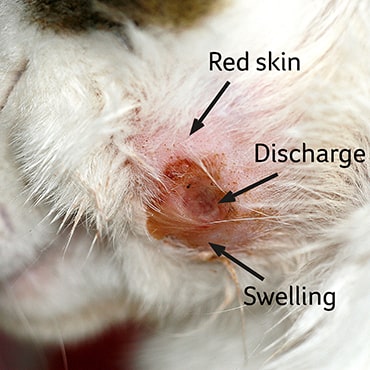Wounds and skin injuries
Overview
- The treatment needed for a wound depends on its size, depth and cause.
- Anything more serious than a minor cut or graze should always be checked by a vet.
- It’s very important to stop your pet licking, biting or scratching their wounds - their tongues are rough and their mouths contain bacteria which can cause infection.
When is a wound an emergency?
First aid and urgent vet treatment is essential for:
- Bleeding wounds (heavy or haven’t stopped after 10 minutes)
- Deep wounds
- Burns
- Bite wounds (including snake bites)
- Wounds that contain an object such as glass
- Eye injuries
- Dirty or infected wounds
Remember, the wound you see on the surface may not be the whole extent of the damage. If you’re worried, contact your vet.
Cuts and grazes
Minor cuts and grazes
Most small cuts are grazes heal in a few days if they are kept clean and dry. Make sure you check and clean your pet’s wound daily and stop them licking it until it’s fully healed. You may need to use a buster collar, protective body suit or T-shirt to stop your pet reaching their wound. Contact your vet for advice if your dog’s wound isn’t healing quickly, or looks infected.
Large cuts and grazes
Large or deep wounds are often very painful and get easily infected. A large/deep wound should always be examined by a vet immediately. Treatment is likely to include pain relief, antibiotics, a bandage, staples, stitches or even surgery. It’s likely that your pet will need restricted exercise while they recover because a lot of movement around a wound can slow healing.
- It’s sensible to rinse dirt out of a wound but don’t try to remove anything large, such as a piece of glass. Apply a temporary bandage over the wound (to limit bleeding before you get to the your vets), but make sure it doesn’t push the object further into the wound.
- If your pet has a wound that is bleeding heavily, apply firm pressure to it and take them to a vet as soon as possible. Read our first aid advice for bleeding wounds.
Bite wounds
Animal bites
Bite wounds are usually more serious than they look and get easily infected because teeth are covered in bacteria. For this reason, always take your pet to your vet if they have been bitten, no matter how big or small their wound is. If your pet has a bad bite wound, it’s likely they will need antibiotics, pain relief and possibly even surgery. Left untreated, bite wounds can be very painful, cause serious infections and even abscesses.
Snake bites
Take your pet to the vet immediately if you suspect they have been bitten by a snake.
Bruising or crushing
Bruises
One small bruise is usually nothing to worry about, but large, multiple or unexplained bruises should always be checked by a vet. Large bruises can be very painful, and multiple, unexplained bruises can be a sign of a bleeding problem.
Crush injuries
Crush injuries (when a pet is crushed under or in something) may not break the skin, but can cause hidden damage. Crush injuries are a very serious type of injury - seek vet help straight away if your pet has been crushed (even if you can’t see any wounds).
Abscesses
An abscess is a painful collection of pus that builds up in a pocket just below the surface of the skin. Often you will see a small wound or scab on top of an abscess. Common examples include cat bite abscesses and dental abscesses in rabbits. Abscesses cause a lot of pain and discomfort because they are under high pressure. Book an appointment with your vet if you think your pet has an abscess.
Treatment
Depending on the type of wound your pet has, your vet may advise the following:
A protective covering
It’s likely that your pet will need a buster collar, body suit, protective sock or T-shirt to stop them (or any other pets) licking, biting or scratching their wound while it heals. The common misconception that ‘saliva is antiseptic’ is false; it’s actually full of bacteria that can cause infections.
Anti-inflammatories
Anti-inflammatories are excellent at reducing inflammation and pain, which in turn, helps speed up recovery.
Antibiotics
Many wounds heal well without antibiotics, but they are sometimes necessary for infected wounds (or wounds that are very likely to become infected).
Cleaning
Wounds heal much faster if they are kept clean. It’s likely that your vet will ask you to clean your pet’s wound daily.
Restricted exercise
If your pet has a large wound, they will need to rest while it heals because it’s likely to be painful and a lot of skin movement around a wound can slow healing.
Cost
Treatment costs for wounds vary a lot depending on the seriousness of the injury and how long it takes to heal. It’s important to speak openly to your vet about your finances, the cost of treatment, as well as what you think is right for your pet. There is often more than one treatment option, so if one doesn’t work for you and your pet then your vet may be able to offer another.
Consider insuring your pet as soon as you get them, before any signs of illness start. This will ensure you have all the support you need to care for them.
Published: August 2020
Did you find this page useful?
Tell us more
Please note, our vets and nurses are unable to respond to questions via this form. If you are concerned about your pet’s health, please contact your vet directly.
Thank you for your feedback
Want to hear more about PDSA and get pet care tips from our vet experts?
Sign up to our e-newsletter
Written by vets and vet nurses. This advice is for UK pets only. Illustrations by Samantha Elmhurst.


